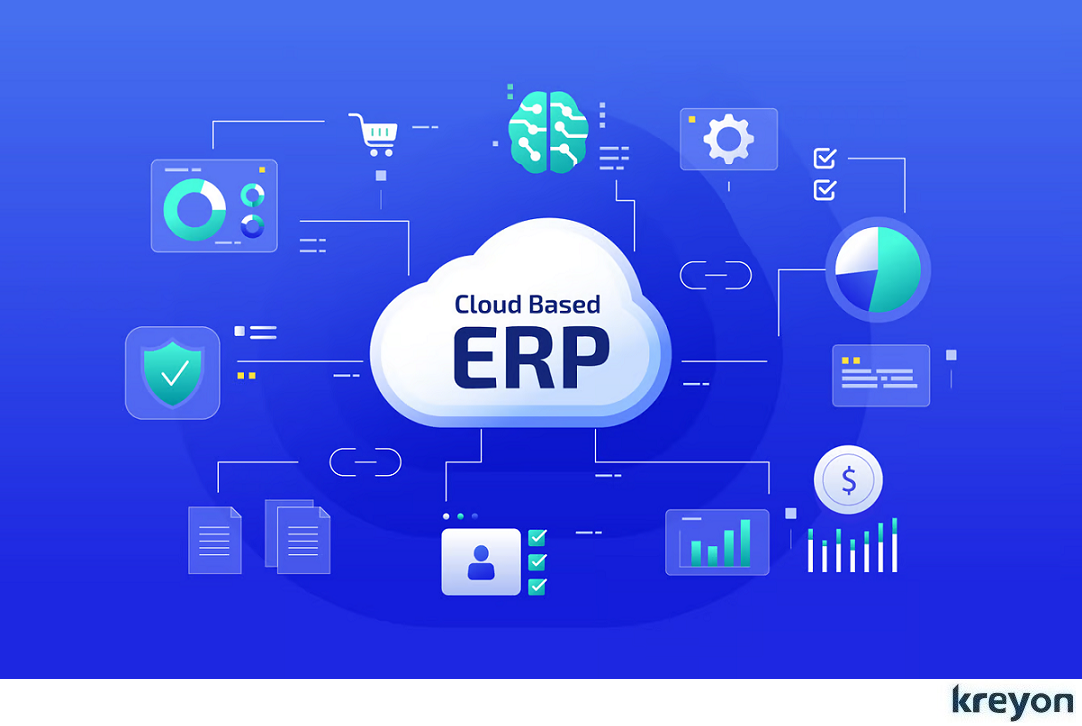ERP for Finance Sector: Revolutionizing Financial Management

ERP systems stand at the forefront of transformation, particularly within the finance sector. The integration of ERP for finance operations is not just an upgrade; it’s a revolution in how businesses manage their financial lifelines.
As financial institutions face increasing regulatory pressures, competition, and the need for digital transformation, ERP solutions are evolving to meet these challenges. Here’s a deeper look at how ERP systems are revolutionizing financial management in the finance sector.
The Core of Financial Transformation
ERP systems, at their heart, aim to consolidate all aspects of an operation into a single, integrated system.
For the finance sector, this means a comprehensive suite of tools designed to handle everything from basic accounting to sophisticated financial planning and analysis (FP&A).
The advent of finance-focused ERP solutions has transformed these systems from mere transactional tools to strategic assets:
Streamlined Operations: Automation of repetitive tasks like accounts payable and receivable reduces errors and frees up financial experts to focus on strategic activities rather than data entry.
Real-Time Insights: Modern ERP systems provide real-time financial data, enabling quicker decision-making. This immediacy is crucial in the fast-paced financial world where delays can cost dearly.
Enhanced Compliance and Security: With regulatory environments becoming increasingly complex, ERP systems help maintain compliance by automating many of the compliance-related processes, reducing the risk of non-compliance penalties.
Customization for Precision: Businesses can tailor ERP systems to fit their unique financial processes, ensuring that the system supports rather than dictates their operational strategy.
The Impact of ERP in the Finance Sector

The integration of ERP into financial management goes beyond mere digitization; it’s about optimizing every financial process, here’s how:
Financial Planning and Analysis: ERP systems automate and integrate various financial processes, such as accounting, budgeting, and reporting. This streamlining reduces manual errors, accelerates transaction processing, and enhances overall efficiency. This foresight is invaluable for strategic decision-making.
Real-Time Data Access: With ERP solutions, finance professionals can access real-time data and analytics. This capability allows for timely decision-making based on up-to-date financial information, enhancing responsiveness to market changes.
Regulatory Compliance: The finance sector is heavily regulated, making compliance critical. ERP systems come equipped with features to help organizations maintain compliance with industry regulations (like GAAP, IFRS & IAS etc) by automating reporting and audit trails, thus minimizing the risk of non-compliance.
Improved Risk Management: By providing comprehensive data analysis and reporting capabilities, ERP systems help finance organizations identify and mitigate risks. Advanced analytics enable better assessment of market risks, credit risks, and operational risks.
Cost Management: By offering detailed insights into costs across the board, ERP systems help in identifying inefficiencies, reducing costs, and enhancing profitability.
Cash Flow Management: Effective cash flow management is at the core of financial health. ERP systems facilitate better control over cash inflows and outflows, ensuring liquidity at all times.
Project Financial Management: For sectors like construction or IT, managing project finances within an ERP framework ensures accurate tracking of costs, revenues, and profitability at project levels.
ERP systems facilitate collaboration across departments by providing a centralized platform for data sharing. This integration ensures that finance teams, as well as other departments, can work together efficiently, leading to improved project outcomes.
Essential ERP Features for the Finance Sector

Effective cash and liquidity management is crucial for financial institutions, as it ensures they can meet their obligations while maximizing their financial resources.
A robust cash and liquidity management strategy involves monitoring, analyzing, and optimizing cash flows and liquidity levels to enhance operational efficiency and financial stability.
For the finance sector, ERP systems need to be equipped with specific features that cater to the intricacies and demands of financial management. Here are the essential features that any ERP designed for the finance sector should include:
i) Comprehensive Financial Management Tools
Cash and Liquidity Management: Cash flow forecasting tools for predicting cash flow needs to ensure adequate liquidity.
Treasury Management: Solutions for managing cash reserves, debt, and investment strategies.
Excess Cash Management: Investing surplus cash in short-term instruments for better returns while maintaining liquidity.
Integrated Financial Management: A robust ERP solution should offer integrated modules for accounting, treasury management, procurement, and project management to provide a holistic view of financial health.
Disbursement Controls: Implementing controls on payments to manage outgoing cash effectively.
General Ledger: A centralized system for recording all financial transactions, which is the backbone of financial reporting.
Accounts Payable/Receivable: Automate invoice processing, payment tracking, and collections to enhance cash flow management.
ii) Budgeting and Forecasting Tools
Effective budgeting and forecasting capabilities are vital for financial institutions. ERP systems should include tools for scenario analysis, trend forecasting, and budget tracking to help finance teams plan more accurately.
Portfolio Management: Investment tracking tools to monitor and analyze investment portfolios, performance metrics, and asset allocation.
Investment Analysis: Features for assessing the risk and return of various investment strategies.
iii) Advanced Reporting and Analytics
Comprehensive reporting tools allow finance professionals to generate detailed financial reports quickly. Advanced analytics capabilities enable predictive modeling and data visualization for enhanced insights.
iv) Multi-Currency and Multi-Entity Support
For organizations operating globally, ERP systems must support multiple currencies and the ability to manage financials across various subsidiaries or branches seamlessly.
v) Integration and Interoperability
APIs for Integration: Allows seamless connection with other business systems like CRM, HR, or third-party financial tools.
Bank Reconciliation Tools: Automated features for reconciling bank accounts with ERP data.
vi) User Access Controls and Security
Given the sensitive nature of financial data, robust user access controls and security features are essential. ERP systems should offer role-based access and detailed audit trails to safeguard information.
vii) Compliance Automation
Regulatory Compliance: Built-in modules to ensure adherence to financial regulations like GAAP, IFRS, or local financial laws.
Liquidity Coverage Ratio (LCR): Ensuring compliance with regulations requiring institutions to hold enough high-quality liquid assets to cover short-term obligations.
Stress Testing: Conducting stress tests to evaluate the institution’s resilience under adverse conditions.
Customizability and Scalability for Financial Companies
The ability to customize and scale systems is crucial for meeting unique operational needs and adapting to market changes.
A financial entity to run its business efficiently using an ERP system, the software needs to be equipped with a suite of features tailored specifically to the financial industry’s needs. Customizability and scalability enable institutions to optimize their processes and support growth effectively.
Unique Business Needs: Financial institutions often have specific requirements based on their size, regulatory environment, and target markets. Customizable ERP solutions allow institutions to adapt functionalities to fit their operational processes.
Workflow Customization: Organizations can modify workflows to align with internal procedures, ensuring that the system enhances efficiency rather than dictating processes.
Adaptable Reporting: Customizable systems can be configured to meet specific regulatory requirements, ensuring compliance with local and international standards (e.g., GAAP, IFRS).
Audit Trails: Institutions can implement customized tracking and reporting features to facilitate compliance audits and regulatory inspections.
Personalized Dashboards: Customizable user interfaces allow finance professionals to create dashboards that display relevant metrics, improving usability and productivity.
Automated Alerts & Data Analytics: Setting up alerts for cash shortfalls or excesses to facilitate proactive management. Leveraging analytics tools for better forecasting and decision-making.
API Capabilities: Customizable ERP systems can integrate seamlessly with existing software solutions (e.g., CRM, risk management tools), creating a unified ecosystem.
Challenges in Implementing ERP in the Finance Sector

Implementing an ERP can significantly enhance efficiency, compliance, and decision-making. However, the journey to a successful ERP implementation is fraught with challenges specific to the financial landscape.
The finance sector is subject to stringent regulations, and ensuring that the new ERP system complies with these can be complex.
Finance departments often rely on various specialized software applications for different functions. Integrating these systems with a new ERP solution can be challenging and may lead to data silos.
Migrating data from legacy systems to a new ERP system can be complex. Inaccurate, incomplete, or poorly formatted data can lead to significant issues, impacting the integrity of the new system.
Here are few other challenges that need diligent planning:
Resistance to Change
Employees may resist transitioning to a new ERP system, fearing disruption to their workflows. Effective change management strategies, including communication and training, are essential to address these concerns.
Data Migration Issues
Migrating data from legacy systems to a new ERP can be complex and fraught with challenges. A well-planned data migration strategy that includes data cleansing and validation is critical to ensuring data integrity.
Cost Considerations
Implementing an ERP system can be a significant investment. Organizations must carefully assess their budgets and consider long-term ROI when evaluating ERP solutions.
Future Trends in ERP for the Finance Sector
i) Artificial Intelligence and Machine Learning
AI and machine learning are set to enhance ERP systems further, enabling smarter financial analytics, automated decision-making, and predictive forecasting.
AI and ML are transforming how financial data is analyzed. These technologies enable predictive analytics, helping institutions identify trends, assess risks, and make informed decisions
ii) Automation of Processes
Automated Cloud ERP solutions are becoming increasingly popular, offering scalability, flexibility, and lower upfront costs due to streamlined processes.
They also facilitate remote access, which is essential in today’s digital work environment. AI-driven automation can streamline routine tasks such as data entry, reconciliations, and compliance reporting, allowing finance teams to focus on strategic initiatives.
iii) Bock chain Contracts
Blockchain can improve transaction security and traceability, reducing the risk of fraud and errors in financial reporting. Automating agreements and transactions through smart contracts can streamline processes and enhance efficiency.
ERP solutions will incorporate blockchain technology to manage contracts, payments and financial transactions with transparency and security.
Conclusion
The integration of ERP systems into the finance sector is transforming how financial institutions operate. By streamlining processes, enhancing compliance, and providing real-time insights.
ERP solutions empower finance teams to make informed decisions and drive organizational growth. As technology continues to evolve, embracing ERP will be key for finance organizations seeking to stay competitive and responsive in an ever-changing landscape.
Kreyon Systems offers a comprehensive ERP specifically tailored for the finance sector. The ERP software streamlines financial management, centralizes data & drives growth. If you have any question, please reach out.
